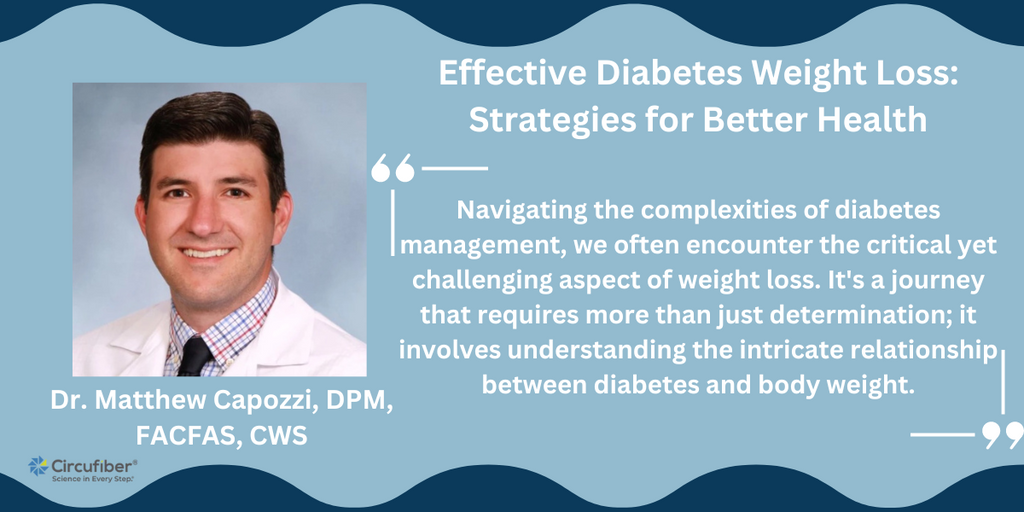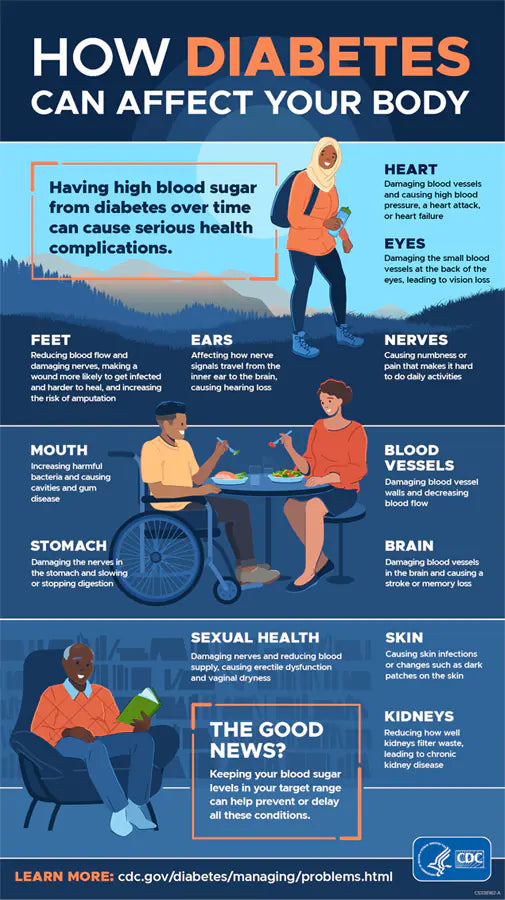Medically Reviewed by:Scientific Advisory Board
Navigating the complexities of diabetes management, we often encounter the critical yet challenging aspect of weight loss. It's a journey that requires more than just determination; it involves understanding the intricate relationship between diabetes and body weight.

From dietary changes to lifestyle adjustments, we'll explore how to effectively lose weight while managing diabetes. Our goal is to empower you with knowledge and tools that make this journey not only successful but also sustainable.
Understanding Diabetes Weight Loss
Shedding excess pounds not only improves insulin sensitivity but also contributes to better blood sugar control, a cornerstone in managing diabetes efficiently. Let's investigate into the mechanisms behind diabetes weight loss and outline some strategies that can support individuals in their quest for a healthier weight, eventually leading to improved diabetes management.
The Connection Between Weight Loss and Improved Diabetes Management
Research consistently shows that weight loss can profoundly impact blood glucose levels. Losing weight decreases the body's resistance to insulin, making it easier to maintain stable blood sugar levels. This is crucial because stabilized blood sugar levels reduce the risk of diabetes-related complications, such as neuropathy, kidney disease, and cardiovascular issues.
Strategies for Weight Loss Among Diabetes Patients
Achieving weight loss with diabetes involves a comprehensive approach, combining diet, physical activity, and behavioral changes. Here's a look at some effective strategies:
- Adopting a Low-Carb Diet: Studies suggest that reducing carbohydrate intake helps lower blood sugar levels and promotes weight loss. Incorporating plenty of vegetables, lean proteins, and healthy fats can create a balanced, low-carb diet that supports both weight and diabetes management.
- Increasing Physical Activity: Regular exercise aids in burning calories and improving insulin sensitivity. Activities like walking, cycling, and swimming are excellent options for individuals with diabetes, providing the dual benefit of weight loss and enhanced mood.
- Behavioral Changes: Setting realistic goals, keeping a food and exercise journal, and seeking support from health professionals or support groups can significantly impact one's ability to lose weight and manage diabetes effectively. These behavioral changes foster a mindset that is conducive to long-term success.
- Monitoring Blood Sugar Levels: Understanding how different foods and activities affect blood sugar levels allows for more informed decisions about diet and exercise, assisting in more effective diabetes control and weight management.
Tailoring Weight Loss Plans to Individual Needs
Given the unique challenges that diabetes presents, it's essential for weight loss plans to be tailored to individual needs. Consulting with healthcare providers ensures that dietary guidelines and exercise regimens are safe and effective, taking into account any other health conditions and the specifics of one's diabetes management plan.
The Importance of Managing Weight in Diabetes
As we've explored, weight loss can significantly enhance insulin sensitivity and optimize blood glucose levels. It's crucial for individuals living with diabetes to understand how losing even a modest amount of weight can lead to substantial health benefits.
Firstly, achieving a healthier weight can improve the body’s ability to use insulin efficiently, thereby helping in stabilizing blood sugar levels. This is particularly essential for individuals with type 2 diabetes, where insulin resistance is a common issue. A decrease in body fat leads to an improvement in the body's insulin sensitivity, reducing the need for medication and minimizing the risk of blood sugar spikes.
Secondly, weight management helps in mitigating the risk of developing diabetes-related complications. Excess weight, especially around the abdomen, increases the likelihood of encountering serious health issues, including heart disease, stroke, and kidney problems. By maintaining a healthy weight, individuals can considerably lower their chances of facing these severe complications, so enhancing their quality of life and longevity.
Besides, weight loss contributes to lowered blood pressure and cholesterol levels, factors that are often problematic in individuals with diabetes. By managing weight, people can achieve better overall health, reducing the burden of diabetes management on their daily lives.
It's essential for individuals to approach weight management through healthy lifestyle changes. Incorporating a balanced diet rich in nutrients, engaging in regular physical activity, and adhering to a diabetes management plan are key steps in this journey. Opting for whole foods, vegetables, lean proteins, and whole grains, while minimizing the intake of processed foods and sugars, forms the cornerstone of a diabetes-friendly diet.
Also, consistent physical activity not only aids in weight loss but also improves insulin sensitivity directly. Activities such as brisk walking, cycling, or swimming for at least 150 minutes a week are recommended.
Strategies for Diabetes Weight Loss
Recognizing the crucial link between weight management and diabetes control, we investigate into several approaches that can foster significant results. The journey to shedding pounds, while managing blood sugar levels, involves a combination of dietary modifications, physical exercise, and consistent monitoring.
Dietary Changes
Our first recommendation centers on adjusting dietary habits to promote weight loss. Integrating foods with a low glycemic index, such as leafy greens, whole grains, and lean proteins, supports blood sugar stabilization. We encourage focusing on portion control, which plays a pivotal role in calorie intake regulation, thereby facilitating weight reduction. It's advisable to minimize the consumption of processed foods and sugars, which can lead to blood sugar spikes and weight gain.
Increased Physical Activity
Incorporating regular physical activity into one's routine stands out as a powerful tool for enhancing insulin sensitivity and accelerating weight loss. Engaging in at least 150 minutes of moderate-intensity exercise per week, such as brisk walking, cycling, or swimming, proves beneficial. We emphasize the importance of consulting with healthcare professionals before starting any new exercise program, especially for individuals with existing health concerns.
Consistent Monitoring and Support
Maintaining diligence in monitoring blood sugar levels is crucial for individuals aiming to lose weight safely. Keeping track of dietary intake, physical activity, and blood glucose levels helps in making informed adjustments to one's diabetes management plan. Also, seeking support from healthcare providers, including dietitians and endocrinologists, can provide personalized advice and encouragement. Joining support groups, either in person or online, offers the opportunity to share experiences and strategies with others facing similar challenges.
Medication Adjustment
Certain diabetes medications may impact weight. Hence, discussing medication options with a healthcare provider is important, as they might adjust prescriptions to support weight loss goals without compromising blood sugar control.
By embracing these strategies, individuals with diabetes can navigate the path to weight loss with greater confidence and effectiveness. It's essential to approach this journey with patience, perseverance, and a focus on holistic well-being, recognizing that every step forward contributes to improved health outcomes.
Monitoring Your Progress
Monitoring progress is an integral part of managing diabetes and achieving weight loss goals. By keeping track of changes, individuals can make informed decisions about their health and adjust their strategies as needed.
Tracking Weight Loss
Logging your weight on a regular basis is crucial. We recommend using the same scale, at the same time of day, preferably in the morning, for consistency. Recording your weight weekly rather than daily minimizes discouragement from natural fluctuations and provides a clearer picture of your long-term progress.
Including measurements of waist circumference monthly can offer additional insight. Since individuals with diabetes often aim to reduce abdominal fat, waist measurements can be a strong indicator of health improvements, even when the scale shows minor changes.
Monitoring Blood Sugar Levels
Regular monitoring of blood sugar levels is essential for those with diabetes, especially when undergoing weight loss. Blood glucose readings can be affected by various factors, including diet, exercise, and weight changes. Keeping a daily log of your readings alongside notes on your meals, physical activity, and medication adjustments helps in understanding how these factors influence your glucose levels. This log becomes a valuable tool for recognizing patterns, making necessary adjustments, and discussing your progress with healthcare providers.
Utilizing Technology
Technology offers powerful tools for monitoring your health. Numerous apps are designed to track dietary intake, physical activity, weight changes, and blood glucose levels. These platforms often allow for easy sharing of data with healthcare professionals, facilitating tailored advice and support.
Wearable devices that continuously monitor glucose levels provide real-time feedback, enabling immediate adjustments to activities and diet. These devices have become invaluable for managing diabetes, offering insights into how lifestyle changes affect blood sugar levels throughout the day.
Engaging with Healthcare Providers
Regular check-ins with healthcare providers are vital. These appointments are opportunities to review your progress, adjust medications if necessary, and receive professional advice on further improving your health. Sharing your logs and data with your provider ensures that your weight loss and diabetes management plan is effective and tailored to your needs.
Challenges in Diabetes Weight Loss
We understand how crucial weight management is for improving insulin sensitivity and stabilizing blood sugar levels. But, achieving significant weight loss and maintaining it over time can be more complex due to several diabetes-specific factors.
Firstly, insulin resistance, a hallmark of type 2 diabetes, can make losing weight a tough hill to climb. Insulin is a hormone that allows our bodies to use glucose for energy. When cells become resistant to insulin, glucose accumulates in the bloodstream instead of being utilized, which can lead to weight gain or difficulty losing weight. This paradox creates a frustrating cycle for individuals attempting to shed pounds.

Secondly, certain medications prescribed for diabetes management, including insulin, can result in weight gain. These medications are essential for keeping blood sugar levels in check but can counteract weight loss efforts. Adjusting these medications requires a healthcare provider's oversight, making it imperative to communicate openly and regularly with one's medical team about weight loss goals.
Another challenge is hypoglycemia, or low blood sugar levels, which can occur during periods of heightened physical activity or dietary changes aimed at weight loss. Symptoms of hypoglycemia may prompt individuals to consume fast-acting carbohydrates, which can interfere with weight loss progress. Developing strategies to prevent or treat hypoglycemia without derailing diet plans is a critical skill that takes time and experience to master.
Finally, finding the right balance between dietary restrictions and physical activity necessitates a tailored approach. Dietary modifications that focus on limiting carbohydrates are effective for blood sugar control but must be balanced with the body's needs during weight-loss-focused exercise regimens. It’s essential to incorporate a diet rich in fiber, lean proteins, and healthy fats to support both diabetes management and weight loss.
Conclusion
Emphasizing the need for a personalized approach, we understand that the journey to weight loss with diabetes is unique for everyone. It's about finding the right balance and strategies that work for each individual, considering the challenges that may come along the way. By staying committed to dietary changes, consistent physical activity, and regular monitoring, sustainable weight loss is achievable.
Research, Studies and Sources:
https://www.cdc.gov/diabetes/managing/healthy-weight.html
More About Circufiber.com and Healthcare disclaimer:
Always consult your physician before beginning any program. This general information is not intended to diagnose any medical condition or to replace your healthcare professional. If you experience any pain or difficulty, stop and consult your healthcare provider. Circufiber.com socks are clinically proven to improve micro-circulation in feet and lower extremities in people with Diabetes.
More Author Information:
Dr. Capozzi is a board-certified foot surgeon through the American Board of Foot and Ankle Surgery. He is a Diplomate of the American Academy of Wound Management and Fellow of the American College of Foot and Ankle Surgeons. He completed a three-year residency program in Foot and Ankle Reconstructive Surgery at St. Francis Hospital & Medical Center in Hartford, CT in 2010. Dr. Capozzi is a board-certified Wound Specialist® granted by the American Academy of Wound Management. He is also board-certified in Foot Surgery through the American Board of Foot and Ankle Surgery.




